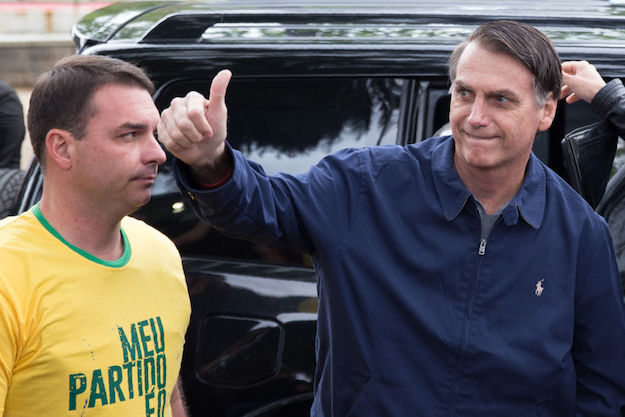SÃO PAULO – It’s not over yet. But it’s close.
Jair Bolsonaro seems very likely to become Brazil’s next president, following Sunday’s election in which he took 46 percent of the overall vote. While he will face a runoff on Oct. 28 against the Workers’ Party’s Fernando Haddad, many international observers, investors and ordinary Brazilians are already looking beyond that day and asking how the right-wing former army captain might govern if elected.
I have followed Bolsonaro closely for more than two years, interviewing him and his sons (also prominent politicians) and maintaining contact with people close to his candidacy. I have written numerous columns chronicling his rise, and I spent last week in Brazil talking to his supporters and critics as well as members of the business community, the media and civil society. In this article, I will omit my personal views about his candidacy, and address in the coldest, most factual terms possible how Bolsonaro might work to fix Brazil’s worst-ever economic crisis and a homicide epidemic that killed a record 63,880 people in 2017, among other policy priorities.
Based on my reporting, and with the caveat that the best-laid plans often change, here are four trends that seem likely to characterize a Bolsonaro presidency:
1. Bloodshed.
If there’s one thing Bolsonaro’s supporters and critics tend to agree on, it’s that upcoming months will bring an onslaught of death in Brazilian cities.
This is after all Bolsonaro’s number-one policy priority: relaxing laws and rules for security forces, allowing them to shoot first and ask questions later (to an even greater extent than today, considering police already kill 5,000 people per year). The goal is to intimidate or kill drug dealers, thieves and other criminals – and thus reverse the inexorable rise in crime since democracy returned to Brazil in 1985.
This may sound to an outsider like hysteria. But it is simply taking Bolsonaro and his allies at their word. There are far too many supporting quotes to list here, but in late August he said criminals “are not normal human beings” and that police should be rewarded, not punished, if they “kill 10, 15 or 20” at a time. The pro-Bolsonaro crowd blames an overemphasis on human rights for Brazil’s violence, arguing that criminals enjoy better protections than common citizens. They essentially want a return to tactics of the 1964-85 dictatorship, when streets were safer.
Most independent experts warn such an approach is doomed, noting that Brazilian society has changed since the 1980s and that militarization of security has spectacularly failed in places like Mexico and Central America – and in Rio de Janeiro since February of this year. Their warnings will be ignored. Brazilian society is in the mood to pound some heads. In a March poll by Ibope, 50 percent of respondents agreed with the statement “A good thief is a dead thief,” a popular catchphrase among those who want a crackdown. Other politicians, including incoming state governors, have enthusiastically embraced Bolsonaro’s rhetoric in recent weeks.
With this approach, many innocent people will die – or be tortured (another tactic Bolsonaro has strongly supported). The crackdown is likely to be accompanied by extra-official violence as well, as “militias” and other organized crime groups connected to the police take advantage of this climate to settle scores and intimidate opponents. Expect more cases like Marielle Franco, the black, queer Rio city councilwoman whose March murder remains unsolved. A Bolsonaro ally who publicly defaced a street sign honoring Franco’s name received more votes than any other candidate on Sunday for Rio’s state legislature. That’s Brazil in 2018.
2. Pro-business economic policy.
The big parlor game on Wall Street (and Avenida Faria Lima) in recent months has been trying to figure out which Jair Bolsonaro they’ll get – the one who consistently supported statist economic policies during his first 25 years in Congress, or the one who over the past year has promised a pro-business approach focused on austerity and privatization.
I’d bet the latter, with considerable certainty.
The truth is Bolsonaro doesn’t really care about the economy – his passion has always been “law and order,” which also includes a crackdown on corruption. But he correctly understood more than a year ago that, to become president, he would need the support of the business establishment. He chose Paulo Guedes, an extremely orthodox University of Chicago-trained economist, to be a kind of “super finance minister” who would run almost all aspects of the economy.
“What if Guedes leaves?” the market frets, with some justification. But they ignore that, at this stage, the true economic guru for Bolsonaro and his supporters is not Paulo Guedes, but Donald Trump.
Laugh if you want. But the Trumpian formula of a strong alliance with business, a hard line on crime, unapologetic nationalism and the rhetoric of economic liberty is now seen by the Brazilian right as a wildly successful test case – and an example to be followed. It is gospel among the cadre of intellectuals who back Bolsonaro on social media and in the press (several of whom, including Olavo de Carvalho, live in the United States). One Bolsonaro adviser drew up a list of Trump’s successes and sent it to the boss during the campaign. Bolsonaro himself has embraced the comparisons.
That doesn’t mean Guedes, or the business community in general, will get everything they want. Some investors expressed concern after Bolsonaro on Monday sat next to Guedes on Facebook Live and vowed he would defend “strategic” industries from privatization. “We’re not going to let just any country come here and take our patrimony,” Bolsonaro added. But this is politically astute – full privatization of Petrobras, for example, would be too extreme for most Brazilians to tolerate even in 2018. And the “any country” comment was probably directed at China – another Bolsonaro bogeyman – rather than foreign capital generally.
With Brazil’s budget deficit running upwards of 8 percent of gross domestic product, its national debt soaring, and its business climate ranked 125th out of 190 countries by the World Bank, a strong dose of orthodoxy is surely necessary to pull the country out of its malaise. The stronger than expected performance by Bolsonaro’s allies, and the right generally, in congressional races on Sunday means that pension reform and other changes should be within reach. There is a risk that Bolsonaro’s security policies, or actions that roll back democracy (more on that in a moment), will generate civil unrest or other political pressure that in turn makes the reform environment more difficult. But in the short term, at least, Wall Street is likely to be quite satisfied.
3. Near-total alignment with the Trump administration.
As stated above, the United States has become a kind of North Star for Bolsonaro and his acolytes – so much so that the candidate even saluted the American flag and chanted “USA! USA!” with the crowd at a campaign event in Miami last October.
This would have been career suicide for virtually any other Brazilian candidate over the past 30 years. But in today’s climate, supporting the U.S. has become a kind of code for rejection of the ideological left, which governed Brazil from 2003-16 and led the country into its current disaster.
The gestures are more than just superficial. Bolsonaro’s team has held meetings with U.S. officials in recent months – common practice during campaigns – and made clear that if elected he will be an exceptionally loyal ally on foreign policy. “It’s like (Washington) made a list of what it wants from Brazil, and they read that list back word for word,” said one person with knowledge of the discussions.
Indeed, you may have to go back to the “carnal relations” of Argentine President Carlos Menem during the 1990s to find a South American government that aligned so enthusiastically with Washington. What does it mean in practice? A much tougher line against Venezuela (and Cuba), full cooperation on anti-drug issues, the possible move of Brazil’s embassy in Israel to Jerusalem, withdrawal from the Paris climate accords, and enthusiastic support for Washington at the United Nations and other international bodies.
This will play well with Bolsonaro’s base, and put Brazil more firmly in line with other South American governments. Argentina, Colombia, Chile and (arguably) Peru are also now run by center-right presidents who have aligned themselves with Trump, although with less enthusiasm than Bolsonaro likely will. Another benefit: Cozying up to Washington has provided effective political and diplomatic cover for regimes such as Guatemala that have flouted democratic norms, especially lately under Secretary of State Mike Pompeo and National Security Adviser John Bolton.
Which brings us to the final trend:
4. Erosion of democracy and its norms.
Here, again, there can be no mistake – Bolsonaro despises democracy, at least the version that has been practiced in Brazil over the past 30 years.
Over the years, Bolsonaro has repeatedly called for Congress to be closed, said the last military government’s biggest mistake was “to torture instead of kill,” and said that if elected president he would “start a dictatorship right away.” More recently, he has vowed to stack the Supreme Court with sympathetic judges. His distrust of civilian politicians means his Cabinet is likely to be composed mostly of former military men, aides say. Bolsonaro’s running mate, a recently retired general, has raised the possibility of a “self-coup,” in which the military would help the president secure greater powers, under certain circumstances.
Bolsonaro has softened his tone somewhat as the election draws closer, saying previous statements were “figures of speech” and that his views on democracy (as with the economy) have evolved. He said on the country’s most popular newscast Monday night that he will be a “slave” to Brazil’s democratic 1988 Constitution and govern with authority, though not authoritarianism. But there is simply far more evidence that suggests Bolsonaro, when faced with resistance, will ignore or trample democratic practices and norms to get his way.
It’s worth mentioning that he may not have to. The outcome of Sunday’s election means Bolsonaro will be dealing with a far more pliant Congress than previously expected, especially if he wins the runoff by a healthy margin and has a strong mandate. Much of the judiciary may also support him.
But the truth is Bolsonaro will have extraordinary power to act as he chooses, at least at first. After the crisis of recent years, many Brazilians see democracy as a synonym for chaos, corruption and leniency with criminals. Just 8 percent of Brazilians told the Pew Research Center in 2017 that representative democracy is a “very good” form of government – the lowest of all 38 countries surveyed. One veteran diplomat who knows South America well compared the current climate in Brazil to Venezuela on the eve of Hugo Chávez’s election. “The hatred of the establishment was so strong that Chávez could do whatever he wanted,” the diplomat said. “People just didn’t care.”









